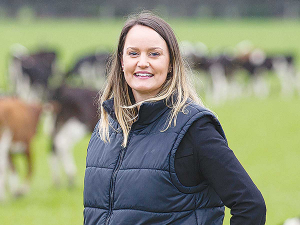Fonterra’s exit from Australia ‘a major event’
Fonterra’s impending exit from the Australian dairy industry is a major event but the story doesn’t change too much for farmers.
 RaboResearch’s Emma Higgins is remaining cautious regarding commodity prices with New Zealand heading into peak milk production.
RaboResearch’s Emma Higgins is remaining cautious regarding commodity prices with New Zealand heading into peak milk production.
Falling dairy prices in recent months are putting this season’s forecast milk payout under strain.
While Fonterra is maintaining its wide range milk price of $5.90 to $6.90/kgMS for this season, analysts aren’t ruling out trimming their forecast payouts if prices continue to head south.
A higher NZ dollar is also likely to negatively impact NZ dairy sector returns.
Westpac senior agri economist Nathan Penny says he remains cautiously optimistic on the outlook, but risks remain high.
Despite the price fall in last week’s Global Dairy Trade (GDT) event, current prices remain consistent with the bank’s $6.50/kgMS forecast.
“However, while we had allowed for prices to fall, we are running out of runway,” he says.
“In other words, if dairy prices continue to fall over coming auctions, noting that the largest auctions for the season are near, we will consider revising our milk price forecast lower.”
ASB senior economist Chris Tennent-Brown says its forecast of $6.75/kgMS “is under some pressure”.
“We will review our outlook after the next GDT auction and Fonterra announcement,” he says. Fonterra announces its full-year results next week.
RaboResearch’s Emma Higgins says she remains cautious regarding commodity prices as New Zealand heads into peak milk production.
Higgins notes that upwards currency movements are also a bit of a headache for exporters right now, with the NZ/US cross inching higher to sit at 67 cents.
“We do, however, expect recovery in the foodservice channel to continue to improve – this will be an important watch for ensuring market balance.
“We are pulling together the next Global Dairy Quarterly report over the next couple of weeks and will be re-assessing our view on the global dairy market fundamentals.”
Fonterra chairman John Monaghan wrote to shareholders last week asking them to remain cautious with on-farm financial decisions.
Monaghan says the global dairy market is finely balanced at the moment, with both demand and supply increasing but it has the potential to change.
“There is good demand in market at this stage of the season, however, the forecast economic slowdown is likely to increase global unemployment and reduce consumer demand,” he says.
Agrisea NZ has appointed Craig Hudson as it's new chief growth officer.
State farmer Landcorp, trading as Pamu, is a forecasting a full-year net profit of around $100 million.
Tony Aitken, chief executive of Ruralco, has been awarded the Excellence in Business Leadership Award at the ANZ Business of the Year Awards.
Global trade has been thrown into another bout of uncertainty following the overnight ruling by US Supreme Court, striking down President Donald Trump's decision to impose additional tariffs on trading partners.
Controls on the movement of fruit and vegetables in the Auckland suburb of Mt Roskill have been lifted.
Fonterra farmer shareholders and unit holders are in line for another payment in April.

OPINION: Here w go: the election date is set for November 7 and the politicians are out of the gate…
OPINION: ECan data was released a few days ago showing Canterbury farmers have made “giant strides on environmental performance”.